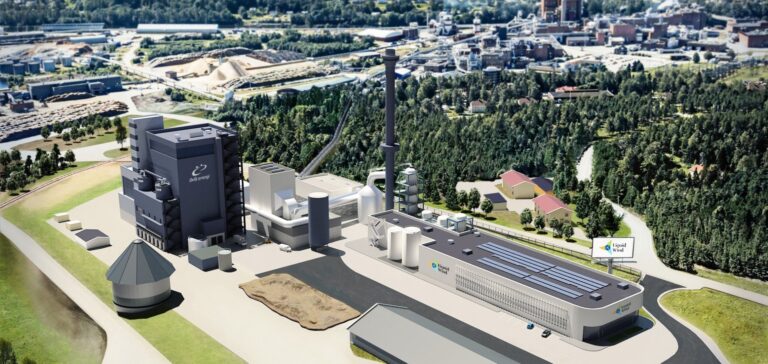The FlagshipONE project, launched in Örnsköldsvik in northern Sweden by Ørsted, is the largest e-methanol project in Europe. This initiative marks the beginning of the project’s construction and paves the way for a new green era in navigation. Thanks to large-scale methanol production facilities, a growing fleet of methanol-powered ships will be able to sail more sustainably. Currently, over 110 e-methanol-powered vessels have been ordered or are already in service, surpassing the 80 registered by the end of 2022. This trend is supported by the introduction of new regulations, such as FuelEU Maritime, which encourage the use of green marine fuels.
Start of production in 2025
The FlagshipONE project plans to start production in 2025, with an annual capacity of 50,000 tonnes of e-methanol. Originally developed by Swedish e-fuel company Liquid Wind, FlagshipONE will be located next to the combined heat and power plant Övik Energi, Hörneborgsverket, in Örnsköldsvik, where the groundbreaking event took place.
The event brought together political representatives from local, regional, national and international bodies, as well as business partners such as Siemens Energy, Carbon Clean and Topsoe. These companies will supply the electrolyzers, control system, carbon capture equipment and methanol synthesis equipment respectively. Local companies are also involved in the project, and its operation will generate direct and indirect employment in Örnsköldsvik.
The event in Örnsköldsvik underlined the importance of decarbonizing global shipping, and Sweden’s considerable potential to become a key player in e-methanol production. This green fuel is becoming the preferred route to zero-emission shipping in the 2020s. Sweden has many opportunities to develop renewable energies, such as onshore and offshore wind power, and benefits from a world-leading forestry industry, which supplies the biogenic carbon needed to produce e-methanol. Örnsköldsvik is an important center of the Swedish forestry industry, with a significant presence of advanced forestry industries.
Ørsted to expand in the Power-to-X energy field
Global shipping accounts for around 3% of the world’s carbon emissions, making it a sector of interest to Ørsted, which is keen to expand its Power-to-X energy presence in Northern Europe and the USA. FlagshipONE is the first e-methanol project in Ørsted’s ambitious green fuels strategy. The company is also developing the “Project Star” project, with a capacity of 300,000 tonnes per year in the Gulf of Mexico region of the United States, as well as the “Green Fuels for Denmark” project in Copenhagen, which will also produce large volumes of e-methanol for the decarbonization of maritime transport.
The FlagshipONE site is located on the site of the Hörneborgsverket biomass heating and cogeneration plant in Örnsköldsvik, operated by Övik Energi. The e-methanol produced by FlagshipONE will be made from renewable electricity and biogenic carbon dioxide captured from Hörneborgsverket. In addition, the e-methanol production processes will use steam, process water and cooling water from Hörneborgsverket, while excess heat will be reused by Övik Energi and integrated into their district heating system.






















